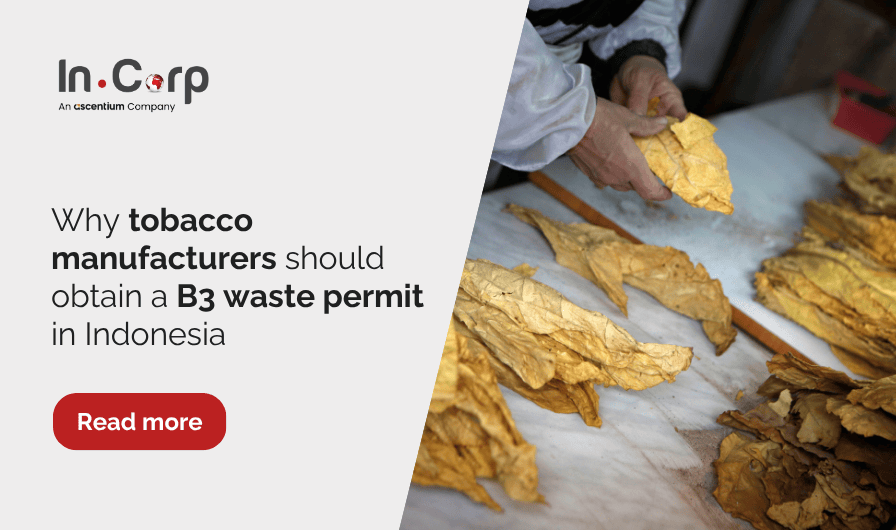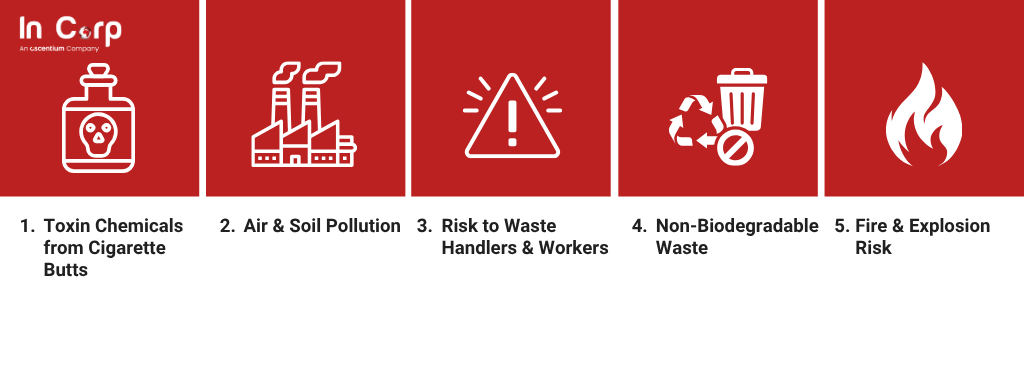The cigarette industry in Indonesia is one of the largest in Asia. Tobacco manufacturers produce large amounts of waste daily, including chemicals, filters, and nicotine residue. This type of waste is classified as B3 (hazardous and toxic) and requires proper handling under Indonesian law.
Without a B3 waste permit, companies risk legal trouble, environmental damage, and harm to public health. Getting the permit is a key step toward responsible production and long-term business success.
Overview of the B3 waste permit
A B3 Waste Permit is an official license the Indonesian government requires for businesses producing, storing, transporting, or managing hazardous and toxic waste (B3 waste).
It ensures that waste handling follows proper safety and environmental procedures, especially in tobacco industries with common toxic byproducts.
Why is it important?
Companies may mishandle hazardous waste without proper permits, leading to serious environmental and health risks. The B3 permit helps to regulate:
- Safe collection and storage of hazardous waste
- Transportation using certified carriers
- Disposal through licensed waste processors
- Documentation and reporting to local authorities
Read more: The importance of the B3 waste permit in Indonesia
Why tobacco manufacturers should obtain a B3 waste permit
The manufacturing process of tobacco creates several harmful byproducts that fall under the B3 waste category. If not handled properly, this waste can be highly damaging to the environment and human health.
Cigarette Butts Contain Toxic Chemicals
Cigarette filters hold residues like nicotine, arsenic, and heavy metals. These toxins can leak into the soil and water, harming plants, animals, and humans.
Air and Soil Pollution
Improper disposal of tobacco waste can release harmful gases or contaminate the ground. This pollution affects nearby communities and ecosystems.
Risk to Waste Handlers and Factory Workers
Workers encountering untreated B3 waste are exposed to respiratory and skin health hazards.
Non-Biodegradable Waste
Cigarette butts are made of plastic fibers that take years to decompose. Without proper waste processing, this leads to long-term environmental damage.
Fire and Explosion Risk
Some chemical byproducts in cigarette factories are highly flammable, posing serious safety risks if not stored and handled under proper B3 permit procedures.
Importance of obtaining a B3 waste permit
For tobacco manufacturers, securing a B3 waste permit shows commitment to legal compliance, workplace safety, and environmental responsibility. Here is why it matters:
- Ensures your business complies with Indonesian environmental laws.
- Prevents pollution by managing toxic tobacco waste properly.
- Reduces the risk of accidents, fires, and chemical exposure in factories.
- Enhances business reputation as a responsible, eco-friendly manufacturer.
- Helps streamline other environmental permit processes and regulatory checks.
Read more: Why Izin Air Bawah Tanah (ABT) matters to your business
Risk of non-compliance
The consequences can be severe when tobacco manufacturers fail to obtain a B3 waste permit. The most critical risks include:
Legal Consequences
Under Indonesian law, operating without a B3 waste permit can result in fines, permit cancellations, or complete factory shutdowns.
Environmental Damage
Improper disposal of hazardous waste in tobacco production can contaminate soil and water, harming ecosystems and nearby communities.
Health Risks to Workers and Public
Toxic exposure from unmanaged B3 waste increases the risk of respiratory illnesses, skin problems, and long-term health conditions.
Financial and Reputational Loss
Non-compliance leads to costly legal issues, cleanup expenses, and public backlash that can damage your brand permanently.
Manage your B3 waste properly with InCorp
If you’re a tobacco manufacturer in Indonesia, you must have a B3 waste permit. InCorp Indonesia (an Ascentium Company) can help you obtain one quickly and efficiently.
With our years of experience in hazardous waste compliance and licensing, we offer:
- Expert consultants with deep knowledge of B3 permit requirements for cigarette factories.
- Proven track record of successful permit approvals across industries.
- End-to-end service that saves time, reduces risk, and ensures full compliance.
Don’t wait until it is too late. Contact us today and let InCorp handle your B3 waste permit from start to finish. Take the first step towards legal compliance and environmental responsibility.
Frequently Asked Questions
Why do tobacco manufacturers need a B3 waste permit?
Because tobacco production generates hazardous byproducts that can harm the environment, workers, and surrounding communities.
What types of waste are produced by tobacco manufacturing?
Common B3 waste includes cigarette filters, nicotine residue, heavy metals, and flammable chemicals from production processes.
What are the risks of not managing B3 waste properly?
Improper disposal can cause air and soil pollution, fires, and serious health hazards for workers and residents.
What are the benefits of obtaining a B3 waste permit?
It ensures legal compliance, prevents pollution, improves workplace safety, and enhances your company’s eco-friendly reputation.
What happens if a factory operates without a B3 waste permit?
Non-compliance may lead to fines, permit revocation, factory closure, and long-term financial and reputational damage.
Get in touch with us.
What you'll get
A prompt response to your inquiry
Knowledge for doing business from local experts
Ongoing support for your business
Disclaimer
The information is provided by PT. Cekindo Business International (“InCorp Indonesia/ we”) for general purpose only and we make no representations or warranties of any kind.
We do not act as an authorized government or non-government provider for official documents and services, which is issued by the Government of the Republic of Indonesia or its appointed officials. We do not promote any official government document or services of the Government of the Republic of Indonesia, including but not limited to, business identifiers, health and welfare assistance programs and benefits, unclaimed tax rebate, electronic travel visa and authorization, passports in this website.




